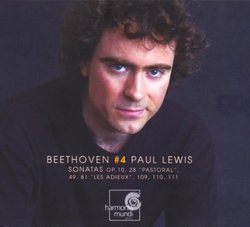| All Artists: Ludwig van Beethoven, Paul Lewis Title: Beethoven: Piano Sonatas, Vol. 4 Members Wishing: 0 Total Copies: 0 Label: Harmonia Mundi Fr. Original Release Date: 1/1/2008 Re-Release Date: 5/13/2008 Album Type: Import Genre: Classical Styles: Chamber Music, Forms & Genres, Sonatas, Historical Periods, Classical (c.1770-1830), Romantic (c.1820-1910) Number of Discs: 3 SwapaCD Credits: 3 UPC: 794881868322 |
Search - Ludwig van Beethoven, Paul Lewis :: Beethoven: Piano Sonatas, Vol. 4
 | Ludwig van Beethoven, Paul Lewis Beethoven: Piano Sonatas, Vol. 4 Genre: Classical
|
Larger Image |
CD DetailsSimilarly Requested CDs
|
CD ReviewsPaul Lewis ends his cycle with triumphant playing and record Larry VanDeSande | Mason, Michigan United States | 05/17/2008 (4 out of 5 stars) "It took many years for Paul Lewis to move out of the shadow of his teacher and mentor, Alfred Brendel. All the benchmarks of Brendel's wonderful mature style -- the subtle humor, moderation, musicianship and lack of excessive self-aggrandizing tactics calling attention to oneself and away from the music -- are on display in this collection. With this recording, which showed up on just about every "Best of 2008" list of classical recordings, Lewis seems finally to have made his mark in the classical world. I bought this set because I like both Brendel and Lewis and because this offering included many of my favorite Beethoven sonatas -- Nos. 7, 15, 26 and 32 -- a group of selections that challenge any player to master Beethoven's youthful fury, midlife wonder and wandering, and his most mature and unrelentingly transcendent music in the final pages of that apocalyptic, other-wordly final sonata. I was never disappointed in Lewis's playing even though I cannot admit he completely convinced me all the time. I find Sviatoslav Richter the most universally appealing player in this repertory although his recordings can sometimes be very disappointing from either an artistic or sound perspective. Lewis is nothing like that -- assured and temperate all the time, completely obedient to the composer's wishes, and more than satisfactory interpreting the wide-ranging messages inherent in each score. I can't say I was completely swayed by the sound of the recordings either. While modern and adequate in detail, there was sometimes a boomy effect you might experience listening in a small hall where the reverb is great enough to obstruct what's going on right now. But this is a minor issue in an otherwise splendid recording of some of Beethoven's most personal music. Anyone interested in Beethoven's piano sonatas that's looking for another perspective should take the leap into Paul Lewis's world. Unless you seek something completely different, I doubt you'll be disappointed for his musicmaking is sober, lyrical, eloquent, expressively iridescent and penetrating without the least bit of inappropriate personalization." Excellent conclusion to Lewis' Beethoven cycle Oldnslow | Seattle, Washington USA | 05/16/2008 (5 out of 5 stars) "Paul Lewis finishes his superb Beethoven sonata series. Consistently fine playing throughout, with Opus 111 a particular highlight. Lewis has given us kind of a modern day Wilhelm Kempff approach to Beethoven. Wonderful lyrical approach, with broad tempos and a powerful technique when called for. Coupled with fine sound, this is a top choice for me for a modern cycle of the greatest piano music ever writen. I am also following Ronald Brautigam's fascinating sonata cycle on forepiano on BIS, which is about mid-point, with the Waldstein and Appassionata due up next." An opus 111 for the ages David A. McKellar | Santa Monica, CA United States | 06/29/2008 (5 out of 5 stars) "i have played only the opus 111 sonata no 32 so far but based on that performance alone, this is a must have recording. i would rank this performance right up there with the greats of all time, namely, richter (live), pollini, arrau and michelangeli. the final measures of this, the greatest sonata ever for piano, are simply spellbinding and breathtakingly sublime. i frankly was stunned by the depth of lewis s spiritual insight into this music.
with this recording, lewis has arrived at any early age into the parthenon of great beethoven pianists." |

 Track Listings (10) - Disc #1
Track Listings (10) - Disc #1








